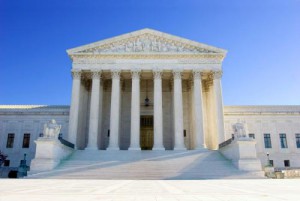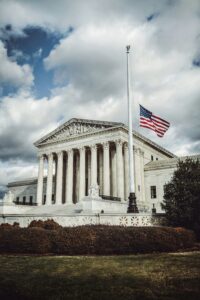December 24, 2015
 On December 22, 2015, the United States Court of Appeals for the Federal Circuit struck down a provision of the federal Lanham Act which prohibited the registration of “disparaging” trademarks by the United States Patent and Trademark Office (“USPTO”). Specifically, the Court found parts of Section 2(a) of the Lanham Act unconstitutional. That section bars registration of trademarks that “[c]onsist of or compromise immoral, deceptive, or scandalous matter; or matter which may disparage or falsely suggest a connection with persons, living or dead, institutions, beliefs, or national symbols, or bring them into contempt or disrepute.” The Court held that “the disparagement provision of § 2(a) is unconstitutional because it violates the First Amendment.”
On December 22, 2015, the United States Court of Appeals for the Federal Circuit struck down a provision of the federal Lanham Act which prohibited the registration of “disparaging” trademarks by the United States Patent and Trademark Office (“USPTO”). Specifically, the Court found parts of Section 2(a) of the Lanham Act unconstitutional. That section bars registration of trademarks that “[c]onsist of or compromise immoral, deceptive, or scandalous matter; or matter which may disparage or falsely suggest a connection with persons, living or dead, institutions, beliefs, or national symbols, or bring them into contempt or disrepute.” The Court held that “the disparagement provision of § 2(a) is unconstitutional because it violates the First Amendment.”
Why is the Refusal to Register Disparaging Trademarks Unconstitutional?
Disparaging Trademarks Ban Violates First Amendment
The facts of the underlying case are straight-forward. Mr. Simon Shiao Tam is the “front man” for an Asian-American dance-rock band named “The Slants.” Mr. Tam named his band The Slants to “reclaim” and “take ownership” of Asian stereotypes. Nevertheless, pursuant to Section 2(a) of the Lanham Act, the USPTO refused to register the mark.
The Court began its decision by noting:
“The government cannot refuse to register disparaging marks because it disapproves of the expressive messages conveyed by the marks. It cannot refuse to register marks because it concludes that such marks will be disparaging to others.”
The Court was particularly troubled by the USPTO’s inconsistent enforcement of the provision. For example, the Court noted that the USPTO refused to register the trademark HAVE YOU HEARD SATAN IS A REPUBLICAN, but did register the trademark THE DEVIL IS A DEMOCRAT. The Court also noted that the USPTO allowed registration of the trademark SQUAW VALLEY for one particular product, but not for another. The Court used these and other similar examples to demonstrate that the government’s selection of what is or is not offensive violated the First Amendment. Accordingly, the USPTO can no longer deny trademark registration simply because the proposed mark may disparage certain groups or individuals.
Protect Yourself
The ruling by the Federal Circuit will likely be appealed by the USPTO to the Supreme Court of the United States. Nevertheless, unless and until an order is issued enjoining the ruling of the Federal Circuit, the USPTO will no longer be able to deny trademark registrations simply based on the message conveyed.
If you are interested in learning more about this topic, please visit the Full Service Litigation practice area of our website. If you are involved in a trademark dispute, please e-mail us at info@kleinmoynihan.com or call us at (212) 246-0900.
The material contained herein is provided for informational purposes only and is not legal advice, nor is it a substitute for obtaining legal advice from an attorney. Each situation is unique, and you should not act or rely on any information contained herein without seeking the advice of an experienced attorney.
Attorney Advertising
Similar blog posts:
Superman v. Superdad: Trademark Lawsuit Continues
Mobile App Provider Slapped with $2 Million Trademark Infringement Lawsuit
PornHub Advertising in Crosshairs for Sloppy Trademark Clearance



